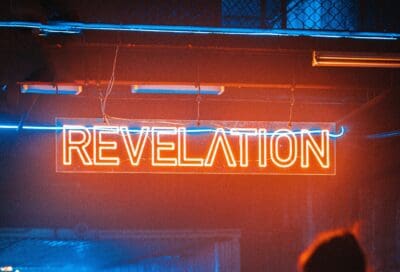Exodus is epic. An underdog leader of a slave nation stands up to the world’s most powerful man. Hail, frogs, flies, and rivers of blood plague the most prosperous nation on the planet. God miraculously divides a major body of water so his people can escape their captors.
That’s just the first half.
No wonder Exodus has held Hollywood’s attention for a long time. Consider full-length feature films including The Ten Commandments (1956), The Prince of Egypt (1998), and more recently, Exodus: Gods and Kings (2014). While these movies get some things right, the true message of Exodus is often lost to make it more palatable for modern taste or for more sensational storytelling.
That’s a shame, because I’m convinced that the true story of Exodus speaks powerfully to our secular world in several ways.
1. God’s focus is his own glory—a good thing.
Throughout Exodus, God unabashedly seeks his glory and wields his sovereign power over creation to achieve it. At the burning bush, he called a self-doubting octogenarian with murder in his past to deliver his people from bondage and lead them to worship in the desert (Ex. 3:1–4:11).
In the plagues, God showed his supremacy over the gods of Egypt by using elements of his creation to prove his power over them (Ex. 7–12). In hardening Pharaoh’s heart (4:21; 7:3; 9:12; 10:1, 20, 27; 11:10; 14:4, 8, 17), he demonstrated his sovereign power over world rulers and nations.
God alone is worthy of all praise—a truth that drives many in our secular culture crazy. While the secular mindset may tolerate some “religious plurality” or say “you can believe your truth while I’ll believe mine,” Exodus makes clear that every false god will one day be crushed, and every knee will bow before our Creator and judge (Phil. 2:10–11).
God isn’t a megalomaniac who desperately wants attention; he’s a loving Creator accomplishing his good purposes by redeeming a people for himself. No raging nation or hardhearted leader will steal his glory or thwart his good purposes for this world or his people.
2. God’s holiness requires judgment of the wicked.
God’s holy wrath burned hot against Egypt’s pharaoh. Egypt’s leader mandated the Hebrew people abort their male offspring (Ex. 1:15–16), enslaved God’s chosen people, and forced them to serve Egypt instead of God (Ex. 5:1, 7:16, etc.). God’s holy wrath led to the final plague that took the lives of all the firstborn in Egypt, from pharaoh’s house to Egyptian slaves to cattle (see Ex. 12:29–30). God even graciously warned them (Ex. 11:4–7).
The righteous judgment of God isn’t the most popular of topics in our supposedly tolerant secular world. Even so, our culture cries out for justice that can be found only in a sovereign God who sets the standards and executes judgment on the guilty.
Without a sovereign God of justice, we have no hope that ultimate justice will come against this world’s oppressors, abusers, traffickers, and murderers. A God of perfect justice will judge every evil deed, and he alone can help us endure this unjust world.
3. Redemption comes by the blood of the Lamb.
The exodus from Egypt is the greatest picture of redemption in the Old Testament, pointing forward to the rescue from the bondage to sin led forth by Jesus Christ, the new and better Moses (Heb. 3:1–6).
A secular worldview doesn’t leave room for redemption, because it would require acknowledging sin as the Bible defines it. According to Kevin DeYoung, the secular confession is not, “‘Woe is me, for I am a man of unclean lips,’ but ‘Woe to me if I think myself unclean.’”
With personal autonomy and finding the authentic self as key aims of the secular worldview, Christian redemption is as offensive as it is esoteric. The secular world must grasp that sin exists and has consequences. Not even Israel could escape God’s judgment without a blood sacrifice of a lamb (Ex. 12:1–3). No sin disqualifies us from redemption that the true Passover Lamb (1 Cor. 5:7) offers by the blood of his cross.
4. God’s grace precedes God’s law.
God gives Israel his law in Exodus 20–24, and as always, context is key. God reminds Israel of how he saved them from Egypt (Ex. 19:4; 20:2) before he explains how the law will help them live out their holy calling among the nations (Ex. 19:5–6; 20:3–17; cf. Eph. 2:1–10; Titus 2:11–14). Stripping the law from this loving, relational context twists its purpose and warps our understanding of God. We should obey because he has saved us, not because a divine taskmaster requires obedience for salvation.
I fear many in our secular age have a bad taste of Christianity due to leaders and churches missing this crucial point. Instead of gospel-motivated obedience that produces life and joy, legalistic understandings of the law lead to fear, misery, and at worst, apostasy.
5. God’s presence brings the transcendent close.
Exodus 1–20 may be the most vivid story of the Old Testament, but that’s only half of the book. The second half focuses on the plans and construction of the tabernacle, the earthly place where God would dwell. Exodus 29:46 is the driving force for the whole book: “And they shall know that I am the LORD their God, who brought them out of the land of Egypt that I might dwell among them” (emphasis mine).
Our secular world champions the notion that every person is equally good and right, yet the tabernacle flies in the face of this notion. The tabernacle shows that nobody is naturally good, and nobody naturally has access to God’s presence without a mediator and a sacrifice for sin. In Jesus, simultaneously our mediator and sacrifice for sin, the transcendent God draws us close.
If our world understood what the tabernacle represents, it wouldn’t search for the transcendent in celebrities, athletes, technology, or astrology. It would rejoice that “the Word became flesh and dwelt among us, and we have seen his glory” (John 1:14).
Greatest Miracle
There’s a lot in Exodus the secularist would reject. First to go would likely be the miraculous events like the burning bush, the plagues, the provision of manna, or the parting of the Red Sea. But the greatest miracle of Exodus—and of the entire Bible—is how a holy God would make a way for sinful people to dwell with him.
That’s a miracle you won’t see in the movies.







